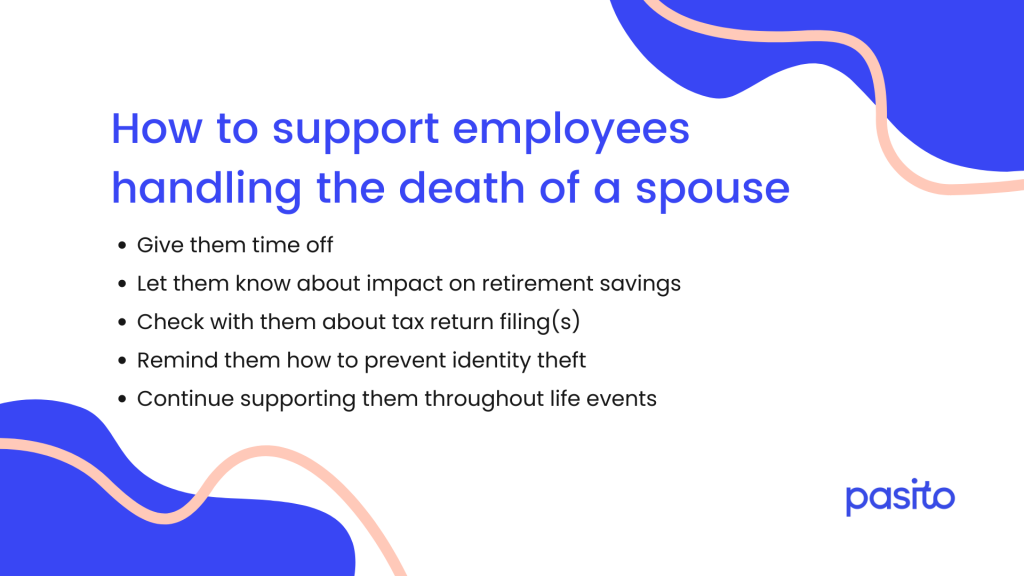Mourning. Funeral arrangements. New life direction.
Parting with a spouse is difficult and heart-breaking, and that’s not to mention the stress of dealing with their last finances on top of everything else.
As an employer of someone whose spouse passes away, you can’t take on the emotional burden. But you can help the surviving spouse better navigate their administrative to-do list.
Keep reading to find out five valid ways you can provide support for employees handling the death of a spouse.

Allow them some time off
As we mentioned in our companion piece about the death of a parent, many companies allow at least three days of paid leave for the death of an immediate family member. This is in addition to unpaid time off as well.
No, Family and Medical Leave Act (FMLA) doesn’t cover bereavement leave. But yes, doing what you can to give your grieving employees time off is the right thing to do (and has long been known to wind up costing your organization less).
Let them know about impact on retirement savings
With the passing of a spouse, people can generally roll the inherited IRA into their own retirement accounts (assuming they meet the qualifications). The big benefit of this is that they can defer the start of taking required minimum distributions (RMD).
There are typically five ways for withdrawing from a 401(k) that has been inherited, and each has different tax implications and can affect how much money is received after taxes. But for surviving spouses, the most advantageous option is to rollover the 401(k) into their own 401(k) and – therefore – defer taxes indefinitely until they would like to make distributions. All other options will incur taxes and are typically for non-spouse beneficiaries.
Either way, tell your employee to keep in mind that amounts in 401(k) can be significant. So, it’s advisable to consult with a professional to make sure they choose and execute the best plan for their situation.
Check with them about tax return filing(s)
Even after death, the IRS requires a tax return be filed for the final year the person was alive. And typically, the IRS will request that a death certificate be included with the return. In terms of income for the return, only income that was earned through the date of death is included. Any amount that is received after is includable on beneficiary returns.
Additionally, the estate of the deceased may need to file a return if the estate earns more than $600 in the year of death, such as from income-producing assets in the estate (stocks, bonds, etc.). This is separate from the value of the estate, and its transfer to beneficiaries (the inheritance most people think of).
And if your employee is a surviving spouse, there is a special filing status for them called “Qualifying Widow(er).” It allows the spouse to file as Married Filing Jointly (MFJ) for two years after the death so long as they don’t remarry and have at least one dependent. This can be very helpful as it allows the surviving spouse to file with the most advantageous tax status in terms of eligibility and deductions.
Remind them how to prevent identity theft
The risk of identity theft is still there even after someone passes away.
Remind your employee to send a death certificate to each of the three major credit reporting agencies as soon as possible to notify them of their spouse’s death. The Social Security office will also notify them, but it can take months. The quicker the agencies receive notification, the lower the chance of credit being opened in their name.
Additionally, remind them to close social media accounts, notify the Department of Motor Vehicles (DMV), and create a listing of financial accounts that were held by the deceased spouse.
Finally, remind your employees to omit personal identifying information (i.e. birthday, address, mother’s maiden name, etc.) in an obituary to reduce the chance of identity theft.
Continue supporting them throughout life events
As the employer, we get that you do what you can when supporting employees who’ve just lost their life partner.
But sometimes, it’s best for surviving spouses to reach out to tax professionals who specialize in estate planning and can help them with their specific situation.
Encourage them to do so.
And keep in mind that the Pasito team will be here if you need help assisting your employees through other qualifying life events. We help employees nationwide receive the tax planning support they need at times they need it most (think: birth of a child, divorce, marriage, etc.).



